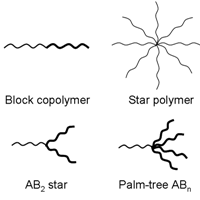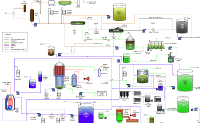What after ASP?
Learning from a polymer injection failure
 What happens to a pool after an ASP flood?
What happens to a pool after an ASP flood?
One operator believed that ASP flood economics aren't positive at lower oil prices. He cancelled his polymer injection and proposed another type of flood instead.
You can get his discussion of polymer injection from his regulatory application -- delivered to you within moments by clicking on the button below.
Get details of this cool tech Subscribers get them for free
Polymer is expensive
Injecting polymer into a floods is much more expensive than just injecting water. Even if the polymer shuts off some water and encourages more oil production, the additional cost of injectant can seriously mar the flood economics.
?subject=Help me get up to speed on ASP flooding&body=Help me get up to speed on ASP flooding%0D%0A%0D%0AMy Name:__________ %0D%0AMy Phone Number:__________ %0D%0A%0D%0A(Or call Proven Sales at 403-803-2500.)">Contact Proven for support. We have all the details from all the installations.
Even polymer floods need pattern balancing
Perhaps even more interesting are the operator's previous applications where he reports pattern problems with the pool. You can find them all through AppIntel.
The pool contains 23 API oil and has some high permeability streaks. He should have taken advantage of the permeability vectors in his flood to improve sweep and recovery.
Polymer injection is not, in itself, a panacea for all problems. Without pattern balancing and a sound flood management system like Optiflood, polymer can accentuate problems in the rock rather than mitigate them. Seems that's what happened to this flood.
Get the real polymer story from applications
Polymer chemical manufacturers all claim superior results and fancy polymer architecture like those shown in the diagram above. But the best way to be sure about polymer results is to study others' field tests.
If you can find a field that is under polymer flood, you can study the success (or failure) for yourself. You can look at the production results. You can determine how much the reserves increased. You can decide how much the water cut dropped.
Find it quick with AppIntel
It's impossible to find polymer and ASP flood information in applications without AppIntel. With AppIntel's natural language search, you can type in a search string like polymer surfactant and find all the applicable applications.
Applications have a much more trustworthy story about the success and failure of ASP than any other source. Better than sales literature. Better than technical papers.
Every application is ground-truthed to an actual well location in UTM or Lat/Long. You can follow up your reading of an ASP application with an actual look back at the production history before, during and after the ASP injection.
Better than technical papers
Applications are a much better source of information than technical papers for two reasons. First, applications are adjudicated by a picky regulator rather than a peer reviewer. The regulator is interested in increasing reserves, not in exploring science.
Second, applications explore both the benefits and also the problems and difficulty with ASP. Technical papers usually only focus on one dimension of field or lab results.
?subject=I want a cheap and cheery one day trial of AppIntel to search for ASP schemes&body=Sign me up fro a one day AppIntel trial so I can to search for ASP schemes.%0D%0A%0D%0AMy Name:___%0D%0AMy Phone Number:____%0D%0A%0D%0APricing: www.appintel.info/short-term-search/%0D%0A%0D%0A(Or call AppIntel Sales at 403-803-2500.)">Contact us now for a one day trial.
Tags: Polymer, Flood, Heavy Oil
 Granger Low 2 Jan 2017
Granger Low 2 Jan 2017

Measuring the rate of oil and gas technology growth
Energy transition inside the oil industry

The rise of water recycle
Join or perish

AppIntel AI hit alerts
Ignite your insight

Blowdown and NCG injection
SIRs often reveal more than submissions

AppIntel AI contains much more than technical papers
More current. More coverage. More detail. More trusted.

New flood to double reserves for heavy oil pool
The age of water floods is not over

Flood repatterning
Extended life support

AI makes opportunity more accessible than conferences
Which sources of technical information do you trust?

Repairing microannulus in thermal wells
Check out the 4D seismic chamber thickness map




 Calgary, Alberta, Canada
Calgary, Alberta, Canada
 Share
Share